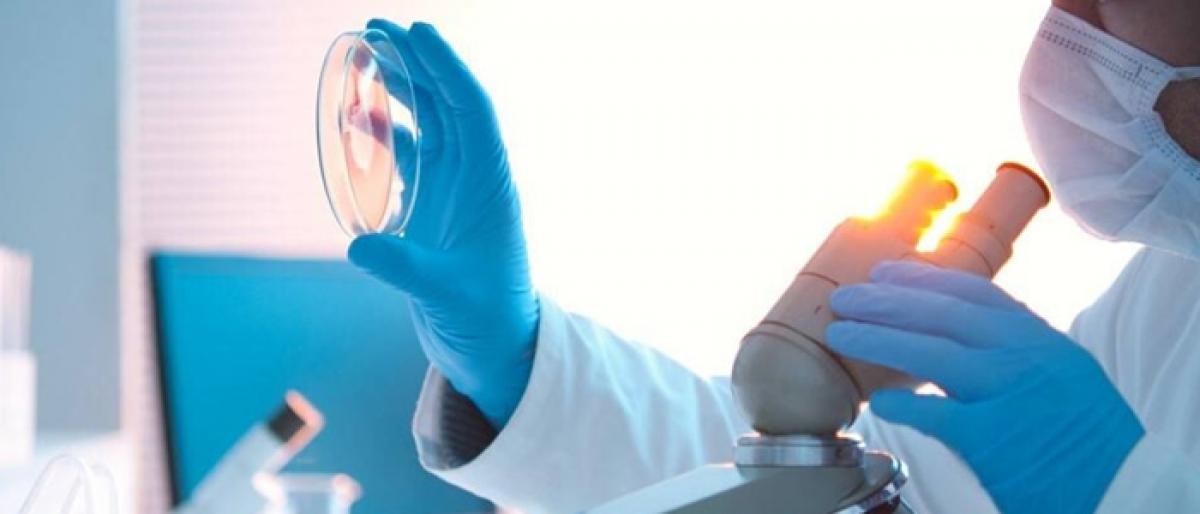Live
- 555th Prakash Purab celebrated with gaiety
- Good news for Atmakur farmers
- High-risk aortic valve replacement surgery performed successfully
- HMWSSB MD holds review meeting on OTS-2024 scheme
- Dhobi Ghat assessed for potential to host sports complex
- SCR bets on LHB train coaches for safety
- SVU felicitates best teachers
- Tata Group to market Araku coffee
- Union Min assures development of infra in tribal mandals
- KTR, Harish will turn political rivals soon: TPCC Chief
Just In

In 2013, European Union banned the use of animals for testing of new cosmetic products. The search for an alternative led to the advent of 3D bioprinting. A cost effective, ethical alternative to the cosmetic industry is the invent of 3D skin tissue.
In 2013, European Union banned the use of animals for testing of new cosmetic products. The search for an alternative led to the advent of 3D bioprinting. A cost effective, ethical alternative to the cosmetic industry is the invent of 3D skin tissue.
A Bangalore-based startup, Next Big Innovation Lab, set up by four young innovative enthusiasts, has brought this unique 3D bioprinting technology to India by developing 3D skin tissue which will address the unmet R&D needs of the healthcare sector in the country.
“Our 3D bioprinted skin tissues (Innoskin) developed using our proprietary technology will allow cosmetic manufacturers to work on formula development that is in line with international regulations and testing guidelines. Hence, animal testing by these companies will be virtually eliminated,” Pooja Venkatesh, co-founder, Next Big Innovation Lab, told The Hans India.
The startup, founded in May 2016, is developing skin tissue for custom suited cosmetic and personalized pharma market. “These cosmetic companies can use 3D skin tissues, which is bioprinted using different skin types from different parts of the human body, to test a range of their products. They can even have user-specific skin cells printed so that people can create cosmetics custom suited to their skin types and needs.
And, with personalized medicine gaining a lot of momentum, 3D skin tissues can be used as models to study various skin ailments, to effectively treat skin scars, and for medical students to practice suturing of wounds,” she explains.
Further, the startup plans to act as a catalyst for the pharmaceutical R&D sector along with working towards a visionary solution. “In pharmaceutical R&D, a plethora of innovative research molecules fail either at the preclinical or clinical trial stages. As opposed to the current 2D models being used in preclinical R&D, our 3D bioprinted tissue is an opportunity to test research molecules on cells in a 3D environment, mimicking the cells natural environment.
Our long-term vision for 3D bioprinted skin tissue is for it to be used as cost effective transplants for burn victims, wound healing, and to provide personalized treatment to people suffering from severe skin ailments,” she adds.
Talking about competition in the field and their plan to reach out to the market, she said that the number of companies operating in the 3D bioprinting space are working on different tissue types. And, at present they are the only startup in India providing 3D bioprinted skin. “Our focus is on creating local and global business partnerships for enhancing product adoption in cosmetic, clinical and pharmaceutical R&D. We have already collaborated with pioneers in the field and are planning a global expansion to drive sales and adoption,” she affirms.
According to recent report, only one out of ten startups tend to survive in the market or after draining out on their initial investment. This company is supported by the Karnataka state, central government and Tata Trusts to the tune of Rs 1.25 crore. Currently incubated at Bengaluru Bioinnovation Centre, she said, “We are recognised under the Startup India and Startup Karnataka Programmes, and we are invited by the German Tech Centre to set up an office in Germany.”
Soon, the company will produce their first 3D bioprinted tissue (Innoskin - 3D bioprinted skin), which is now under internal validation. In another 15 years based on the regulations their product has to go through, they would be coming up with vitro organogenesis through 3D bioprinting. Talking about their strength, Pooja said: “Our core strength is the technology we developed in-house and our engineering expertise. We have developed a 3D bioprinter from scratch, this will help us fast track our R&D and develop consistent products. We are also building customised 3D bioprinters for various clients.”
Like many other new ventures, this startup also face several challenges. Foremost among them is that there is a lack of understanding about 3D bioprinting technology in the country. “A dearth of indigenous and cost-effective products drives a need for our 3D bioprinted skin. But, the major challenge is that the regulatory framework in India is not well-defined since it is a new technology. We would like to work closely with the government to understand the regulatory approvals required and, also help define these compliances,” concludes Pooja.
By: Divya Rao

© 2024 Hyderabad Media House Limited/The Hans India. All rights reserved. Powered by hocalwire.com







